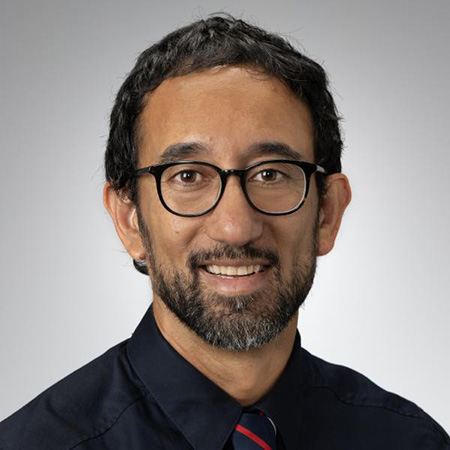Faculty Spotlights >> Peter Santa Maria: Physician and Innovator
Building Capacity in One of the World’s Poorest Countries

Medicine
Peter Santa Maria, vice chair of clinical and translational research and professor, Department of Otolaryngology–Head and Neck Surgery, at the University of Pittsburgh School of Medicine, says there are lessons to be learned in the Gorongosa Restoration Project (GRP) in the Republic of Mozambique.
This unique public-private partnership began in 2008 as an agreement between the Mozambique Ministry of Health and the Carr Foundation to conserve and restore Gorongosa National Park’s wildlife population that had been depleted by decades of civil war. It has since expanded to an additional 25-year commitment by multiple partners to create a mandate of biodiversity and people-centered development in one of the poorest nations on earth.
GRP currently employs more than 1,800 individuals in the areas of conservation, science, human development, administration, finance and communication. They are building schools and science labs and creating a nature-based economy around coffee and honey factories.
But keeping people healthy is key to the success of the project.
Santa Maria is on board, making this mission his own.
“We’re not just flying in doctors, then flying back home.
We are here for the long term, building a framework for public health that includes development and training, capacity building, innovation, research and technology.”
Enhancing Ear, Nose and Throat Care
Pitt’s Department of Otolaryngology–Head and Neck Surgery works with Mozambique’s Ministry of Health to strengthen local doctors’ skills for ear, nose and throat care. With support from the Eye and Ear Foundation of Pittsburgh and the Brother’s Brother Foundation, they also provide medical equipment for programs like newborn hearing screening and nonsurgical treatments for pediatric ear infections.
He frequently travels to Mozambique as part of a team of researchers, medical professionals and others who are working together to improve the health and well-being of more than 250,000 people living in villages and communities surrounding Gorongosa National Park.
Using the expertise of the University of Pittsburgh Health Sciences, Santa Maria and the team seek to understand the details of unmet medical needs in the region and help find viable solutions.
Every year, on a weekly basis, Santa Maria virtually mentors 10 or 12 students from Mozambique. That experience culminates in a “boot camp” in Gorongosa. The Pitt team listens to the needs of the community and brainstorms ways to implement solid health care practices. They offer innovative ideas on how to improve nutrition and maternal health, building trust and, eventually, capacity in the area. After boot camp, the local teams receive ongoing support to serve their community.
“We’re not just flying in doctors, then flying back home,” says Santa Maria. “We are here for the long term, building a framework for public health that includes development and training, capacity building, innovation, research and technology.”
The backbone of the health system is the revitalized Vila Gorongosa Hospital, which is managed jointly by the GRP and the Mozambique Ministry of Health. To date, more than 380 mobile clinics staffed by more than 630 community health workers have been established to serve the local population as well as a cohort of more than 100 “Model Moms and Dads” who support maternal and child health.
“There is a strong and deep relationship between Pitt and the GRP,” notes Santa Maria. “We believe it will create an exemplary nature-based economy and health system model that will inspire sustainable development, not only in Mozambique, but throughout Africa and beyond.”
